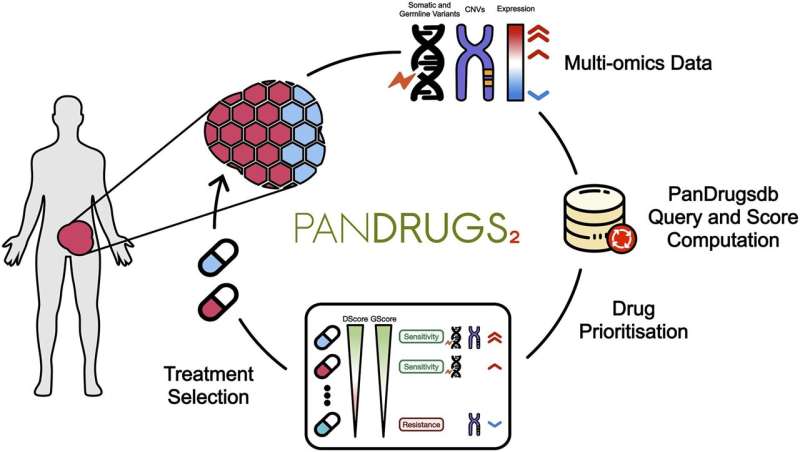This article has been reviewed according to Science X's editorial process and policies. Editors have highlighted the following attributes while ensuring the content's credibility:
fact-checked
peer-reviewed publication
trusted source
proofread
Software program that looks for the most effective drugs helps to personalize cancer treatments

Precision medicine seeks to adapt treatments to the characteristics of each patient. Genome studies are providing more and more data to achieve this, but this very abundance of information is hampering the task: Doctors must interpret numerous genetic alterations, and only a few will be relevant to diagnose the type and stage of each cancer and decide how to treat it.
To facilitate this task, the Bioinformatics Unit at the National Cancer Research Centre (CNIO) and the University of Vigo have just launched the PanDrugs2 software program, which generates reports to facilitate clinical decisions.
PanDrugs2 analyzes the genomic data of each patient in search of molecular targets, in other words molecules on which existing drugs act. The platform calculates one scoring system for the genes that are relevant and another for drugs that could act on them. The highest scores are received by drugs with the greatest scientific evidence as being effective against the therapeutic targets detected in patients. From these scores, the tool generates a ranking of treatments
Altogether, the platform handles data on 4,642 genes and 14,659 unique chemical compounds. Based on that information, it has generated 74,000 associations between drugs and genes.
The development of PanDrugs2 has been co-directed by Fátima Al-Shahrour, head of the Bioinformatics Unit at CNIO, and Daniel Gonzalez Peña, from the University of Vigo, researcher with the New Generation Information Systems group at CINBIO. PanDrugs2 has just been featured in the journal Nucleic Acids Research.
"PanDrugs2 aims to help consolidate precision medicine in clinical practice," says Gonzalo Gómez-López, a researcher at the CNIO Bioinformatics Unit and co-author of the paper. "We have sought a clear display format that is very easy for professionals to interpret, but still exhaustive. We want all the knowledge available so far to be useful in medical consultations."
Approved, experimental and trial drugs
PanDrugs2 improves on the previous PanDrugs platform, published five years ago. For example, it is the first platform that takes into account inherited (or germinal) mutations, in addition to those originated after conception (or somatic). This is essential information for precision medicine, because inherited mutations "are responsible for variations between individuals in terms of the required dosage of medicine. Or for one substance being more effective than another," explains Gonzalo Gómez-López.
As for information regarding drugs, PanDrugs2 classifies them according to the type of disease for which they are indicated, the resistance they may generate; or the clinical phase in which they are: In trial, US approved, EU approved, experimental treatments, etc.
Open source, easy to update and with more scientific evidence
The program is free and open source. Given its tremendous utility in research, it offers two modes of consultation: clinical, aimed at medical professionals, which includes in its results approved and / or clinical trial drugs; and discovery mode, aimed at scientists, which takes into account direct therapeutic targets [mutated genes] and indirect ones [other genes that are also involved in the development of the disease], and also includes experimental treatments.
The new version is updated semi-automatically and faster: "We have gone from updating in weeks to a few days. That makes the maintenance and release of new versions even easier," says Gómez-López.
More information: María José Jiménez-Santos et al, PanDrugs2: prioritizing cancer therapies using integrated individual multi-omics data, Nucleic Acids Research (2023). DOI: 10.1093/nar/gkad412


















